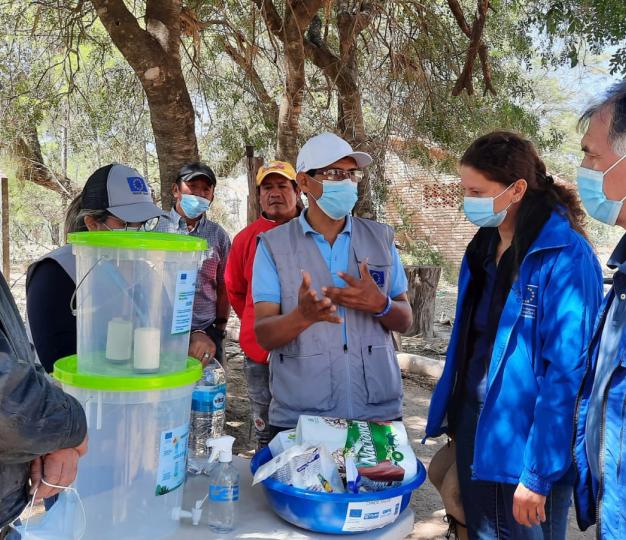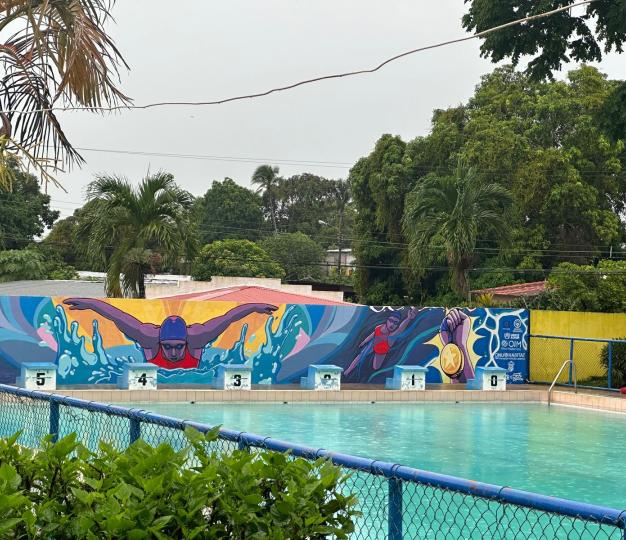Security, migration and humanitarian aid
Participation of Panama in security projects
Panama is among the countries with the highest organised crime rate, ranking 17th out of 193 countries and 6th out of 35 American countries in crime, according to the 2023 Global Organised Crime Index report. Financial crime, cybercrime, fraud, human trafficking and money laundering have increased in 2024. This situation is due to factors such as: the use of Darien, the dense forest strip connecting Central and South America, as a refuge for criminal organisations; the geostrategic relevance of the Panama Canal, which accounts for 3% of global maritime trade; the important international financial centre that attracts actors involved in money laundering and drug trafficking.
Therefore, the European Union (EU), together with its partners, is implementing and financing numerous regional and international projects in the area of security in Panama. The main themes of these projects are the fight against organised crime, illicit trafficking (maritime and air), arms trafficking, cybercrime and migration. See all projects here.
One of the most noteworthy projects is the Assistance Programme Against Organised Crime (EL PAcCTO 2.0), which strengthens justice and security institutions and policies in Latin America and the Caribbean to address organised crime from a comprehensive perspective (police, justice, prisons). Its second phase has been implemented since 2023. One of the programme’s main achievements is the Latin American Committee on Internal Security (EU-CLASI), which was created in the first phase of the project, with the aim of jointly defining regional strategies and public policies against transnational organised crime.
Humanitarian aid and civil protection
The European Union has allocated 12.4 million euros to Panama since 1996 to respond to emergencies and support its disaster preparedness. This EU work includes the distribution of food, shelter, medical supplies and actions to increase disaster response capacity, complementing local and regional efforts to mitigate its consequences. Health campaigns are also developed for the prevention of diseases. For example, following the floods of November 2024, the EU allocated €130,000 in humanitarian funding to directly benefit 2,500 people in the most affected areas, in the provinces of Los Santos, Panama and Herrera.
In 2022, the EU opened the Regional Support Office of the Directorate-General for Civil Protection and Humanitarian Aid Operations (DG ECHO) in Panama in 2022 to improve the efficiency and quality of humanitarian response in the region. That same year, a humanitarian aid inventory was inaugurated in Panama, located at the Humanitarian Hub facilities in Panama Pacífico, with the aim of allowing the EU to respond quickly to sudden humanitarian crises, offering free materials to all Latin America and the Caribbean within a maximum period of 72 hours.
Panama is also one of the 25 countries supported under the Programmatic Alliance between the European Union and the International Federation of Red Cross and Red Crescent Societies (IFRC). This humanitarian alliance seeks to support epidemic and pandemic preparedness efforts with a multi-year allocation of EU funds. In addition, this year, the European Union has approved a regional humanitarian aid package for Central America and the Caribbean worth more than 5 million euros, which will be dedicated to respond to the intense hurricane season in the area.
EU humanitarian aid is not influenced by any political, strategic, military or economic objectives as it is governed by the principles of humanity, neutrality, impartiality and independence. It aims to save and preserve lives, prevent and alleviate human suffering and safeguard the integrity and dignity of populations affected by disasters and conflicts. Continue reading here.
Migration
- DG ECHO humanitarian operations in Darien
Since 2021, the European Union’s Directorate-General for Civil Protection and Humanitarian Operations (DG ECHO) has focused on responding to the humanitarian needs of people transiting the Darien and travelling as part of mixed migratory movements. So far, DG ECHO has provided 7 million EUR through its humanitarian partners with view of providing multi-sectoral life-saving services with a special focus on vulnerable groups and children. They include protection services that integrate psychosocial care, legal assistance, safe spaces, prevention and care of cases of violence, including sexual violence, the dissemination of safe and reliable information, as well as water and sanitation services. Through these humanitarian actions, coordination is also ensured between the different humanitarian actors and donors, including the authorities of the country, in order to avoid duplication of efforts and ensure greater coherence of ongoing operations. See more information here.
- Inclusive Cities, Solidary Communities
The project Inclusive Cities, Solidary Communities was born in 2021 to strengthen local governments and communities in several Latin America and Caribbean countries in managing the impact of the crisis of mixed migratory flows and support socio-economic reactivation in cities. The actions implemented include the analysis and systematisation of information relevant to the response of cities to COVID-19; workshops for public officials; and cash transfer actions to cover the basic needs of vulnerable communities in the cities targeted by the project. In Panama, concrete actions include informing and supporting the local government of La Chorrera; including migration and asylum aspects in urban strategies and planning; promoting social cohesion between the host community and refugees/migrants, and strengthening the capacities of local governments, civil society organisations and the private sector. Continue reading.
- Promoting peaceful coexistence in the COVID-19 response for migrants, refugees and other vulnerable populations in Central America and the Caribbean
Between 2020 and 2022, this project facilitated access to health and social security services for people in vulnerable situations, improving response capacities in governments' approach to sensitive challenges caused by the pandemic by promoting peaceful coexistence and anti-discrimination/xenophobic efforts in the region. In Panama, the project focused on the Darien Zone and provided health services and basic needs; strengthened the capacities of authorities, communities and organisations; worked on conflict prevention and promotes educational and cultural actions with families and children. See more here.






